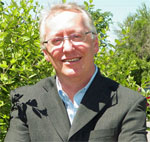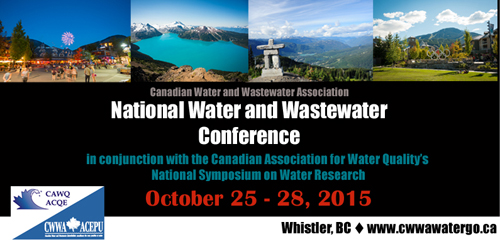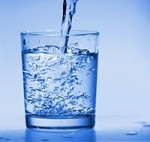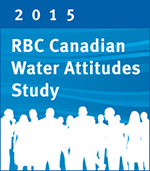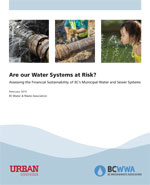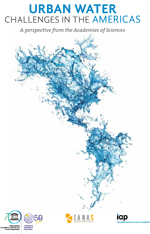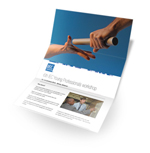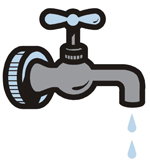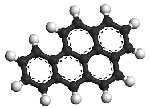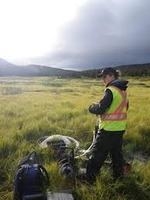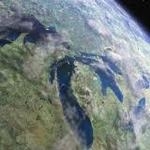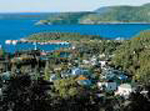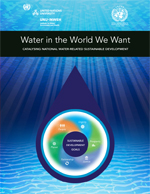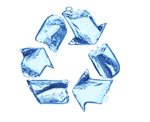| March 26, 2015
|
In This Issue |
|
CWWA News
|
|
|
Member News
|
|
|
Federal Initiatives
|
|
|
CAWQ News
|
|
|
Provincial News
|
|
|
International News
|
|
|
Upcoming Events
|
|
|
Snippings and Clippings
|
|
Sunday, March 22nd was World Water Day and marked a very busy month in the world of water information...and CWWA is very much involved on the national and international scene.
|
As concerns continue about the impact of flushable and non-flushable wipes on our wastewater systems, collaborative efforts are underway between the product producers and the wastewater industry. The wipes producers and sellers are represented by their trade organization known as INDA, while the wastewater industry is represented by the Water Environment Federation (WEF), the National Association of Clean Water Agencies (NACWA), the American Public Works Association (APWA) and the Canadian Water and Wastewater Association (CWWA).
|
CWWA’s National Committee on Climate Change is organizing several focused sessions during the 2015 National Water and Wastewater Conference which will deal with Climate Change and how it affects infrastructure. In preparation we are reaching out to federal departments in order to understand the initiatives and priorities at federal level in relation to climate change. Please forward the contact information of your department’s key climate change contact to our chairperson – Hiran Sandanayake at Hiran.Sandanayake@ottawa.ca.
|
Be sure to mark your calendar for CWWA’s first National Water and Wastewater Conference. Scheduled for October 25-28 at the Fairmont Chateau Whistler – an amazing venue that will bring our delegates together in one of the most beautiful parts of the country.
CWWA’s Drinking Water Quality Committee submitted comments on Health Canada’s new proposed guidance for pH in drinking water. As always the Committee is appreciative of the extensive background information given in the Guidance produced by Health Canada and the Committee on Drinking Wat
|
In recognition of Steve Bonk’s guidance and development of CWWA and his roles as leader and ambassador of the water and wastewater sectors, a scholarship in his name was established by CWWA in 1995. The scholarship is intended to provide educational assistance to those embarking on careers associated with municipal water supply or wastewater. The scholarship of $500 will be awarded annually. For more information please visit our website.
|
Sensor are experts in the electronic testing of waterproofing systems they developed and installed the first monitoring systems for the storage of waste 25 years ago. In the last 15 years Sensor has also developed technology in the UK that provides protection to potable / drinking water storage tanks from inward leaks, preventing coliform bacteria, petrochemical contaminants, or other noxious substances from entering the stored water.
|
As seasons begin to shift, we are reminded of how drinking a glass of water to cool off on a hot summer day or hydrating with tap water before heading off on a hike can quench our thirst and replenish our bodies. The quality of that water is second only to hospitals in terms of what Canadians want their taxes to fund, ahead of roads, schools and public transit.
|
The BC Water and Waste Association recently released a new report "Are our Water Systems at Risk" that assessed the financial capacity of BC’s municipalities to maintain, renew, and replace BC’s existing water and wastewater infrastructure.
|
The Ontario Climate Consortium (OCC), Clean Air Partnership (CAP), and York Region are currently leading a study focused on developing municipal climate risk and vulnerability information in support of broader adaptation planning efforts in the Greater Toronto and Hamilton Area (GTHA). Currently, this work is focused on the Regional Municipality of York and builds on previous work conducted in Peel Region and the City of Toronto.
|
IANAS (The Inter-American Network of Academies of Science) and UNESCO have just released a book titled "Urban Water Challenges in the Americas. A Perspective from the Academies of Sciences." The release date also coincides with the UNESCO World Water Day on March 22.
|
FCM recently announced that they are renewing its Green Municipal Fund (GMF) program. According to the press release the renewed program will include broader eligibility for capital projects in energy, transportation, waste and water sectors and improved application forms and resources will support a more efficient and streamlined application process. The renewed offer takes effect on April 1, when new application forms and resources will be available, but you can find detailed information on the FCM website.
|
FCM’s Green Municipal Fund recently announced a new Leadership in Asset Management Program (LAMP), set to begin in fall 2015.
|
SCC is looking for young managers, engineers and technicians (aged 20 to 35 years old) to participate in this year’s competition to send one lucky individual to the 6th Annual IEC Young Professionals workshop in Minsk, Belarus from October 12-14 2015.
|
MP Francis Scarpaleggia (Member of Parliament for Lac-Saint-Louis and Chair of the National Liberal Caucus) has tabled a private members bill to address water efficiency, water conservation and recycling.
|
Health Canada and the Committee on Drinking Water have published new proposed guidance for benzo[a]pyrene in Drinking Water.
|
New Hazardous Products Regulations, pursuant to the Hazardous Products Act, were published in the February 11, 2015 edition of Canada Gazette Part II. The new regulations update the current Workplace Hazardous Materials Information System (WHMIS) to introduce the Globally Harmonized System for the Classification and Labelling of Chemicals (GHS).
|
With the recent announcement of the changes to Canada's Workplace Hazardous Materials Information System (WHMIS 2015), a website has been developed to help Canadians transition from the old WHMIS system to WHMIS 2015 which implements the Globally Harmonized System of Classification and Labelling of Chemicals (GHS).
|
Environment Canada released, February 6, 2015, the Canadian Environmental Protection Act, 1999 Annual Report for April 2013 to March 2014. The document discusses, in part, key risks; living organisms; air pollution and greenhouse gases; water quality; waste; environmental emergencies; reporting; public participation; and compliance promotion and enforcement.
|
The 3rd Canadian Young Professionals Summit – Water and Me – will be held in Québec City on May 27th 2015. The Summit will be an excellent opportunity to discuss the future of the water industry with your peers. Dedicated workshops, a panel discussion, a high profile talk and a visit to the wastewater treatment plant will provide an excellent platform for the exchange of knowledge, skills and experiences between senior experts and YPs from government, academia, consultancy, utilities and engineering firms. E-mail: info-yp.summit@ulaval.ca for more information.
|
The Ontario provincial government has published a technical discussion paper which summarizes the proposed rationale for moving some specific short-term, non-recurring water taking activities from the Permit To Take Water process under the Ontario Water Resources Act to the self-registration process on the EAS.
|
British Columbia’s Ministry of Environment announced, February 5, 2015, that a new fee and rate schedule for users will take effect in January 2016 to coincide with the implementation of the province’s new Water Sustainability Act (Bill 18-2014; royal assent May 29, 2014).
|
A draft Regulation to amend the Regulation respecting the application of section 32 of the Environment Quality Act, was published in the February 11, 2015 edition of Gazette officielle du Quebec. The existing regulation is amended in section 23 by adding "or standard NSF/ANSI 61 - Drinking Water System Components - Health Effects" at the end of the first paragraph.
|
Ontario’s Minister of the Environment and Climate Change (MOECC), Glen Murray, announced February 18, 2015, that he proposes to re-introduce the Great Lakes Protection Act - a measure which died on the order paper when the government announced the 2014 provincial election.
|
UNU-INWEH and UNOSD, together with partners at the Global Water Partnership and McMaster University, have undertaken an analytical exercise to identify what implementation to achieve proposed Sustainable Development Goals (SDGs) will look like at the country level. This initiative directly builds upon a global assessment of the role of water in sustainable development that we concluded in 2013. Findings of this country-based study, combined with the underlying evidence are presented in the Policy Brief - Water in the World we Want.
|
This Workshop will feature Canadian and International experts on wastewater management and collection systems. It will explore the challenges of managing "flushable" products in the collection system - the consequences of flushing products not designed to pass through the collection and treatment systems, the needs to work with industry to develop better flushable products and strategies to influence consumer behaviour.
|
The International Workshop on Water Reuse will feature leading international and Canadian experts from academia, industry and Government, deliberating on best practices, municipal & industrial reuse, treatment technologies, case studies, standards, regulations, management tools, health and environmental issues. The proceeds from this Workshop will help support Canadian participation in standards development. For more information on the Workshop, registration and sponsorship opportunities visit the CWWA website.
|
Browse a complete calendar of events hosted by CWWA and our member organizations.
|
Journal of Commerce The 2015-16 Budget is balanced, with a surplus of $107 million. Overall revenue is $14.28 billion, up just 1.2 per cent from last year. Overall spending is $14.17 billion, also up just 1.2 per cent from last year.
|
Water Canada Reliable water, sewer, and stormwater systems are essential to public health, a clean environment, and a strong economy. But these essential systems may be at risk—aging infrastructure, growth, strengthened regulations, and climate change are driving the need for significant upgrades and re-investment in the pipes, pumps, and equipment that are used to treat, deliver, and remove water safely from our homes and businesses. At the same time, fiscal restraint and public complacency impede the ability of local governments and water utilities to secure the financial resources required to sustain our water infrastructure assets.
|
Water Canada The governments of Canada and the Northwest Territories have announced a new cooperative water-monitoring agreement, which will help advance the understanding of the ongoing collection, processing, publication, and distribution of water-quantity data in the territory.
|
www.mondaq.com In 2011, we wrote about the innovative stormwater fee adopted by Kitchener, Ontario, following English and American precedents. Instead of funding storm water management through fees for municipal water, which penalizes heavy water users such as laundries, these municipalities fund the cost of managing stormwater through taxes on those who create storm water management problems by having large impervious surfaces, such as flat (non-green) roofs and parking lots. You pave, you pay.
|
Newswire.ca The Canadian Institute of Plumbing & Heating (CIPH) announces University of Waterloo students as winners of Canada's Most Water Wise School Case Competition
|
University of Calgary The University of Calgary and The City of Calgary will unveil the $38.5 million Advancing Canadian Wastewater Assets (ACWA) facility at the Pine Creek Wastewater Treatment Plant on Tuesday, March 17. This facility is the first of its kind in the world, where university researchers are working side-by-side with municipal operators to advance wastewater treatment technologies and knowledge that will lead to cleaner water, a better protected ecosystem and improved public health.
|
Edmonton Journal EDMONTON - A model waste water treatment plant that included little plastic pieces of sewage was the winner Monday in the city’s I Love Edmonton Lego building contest.
|
Winnipeg Free Press Milwaukee has been famously connected with beer-making since the mid-1800s. It was once the headquarters for Schlitz, Blatz, Pabst and Miller, though today Miller is the only large brewery left in town. And, as a new micro-micro-microbrew demonstrates, the local spirit of zymurgy (fermenting and brewing) is clearly alive and well.
|
Canadian Water Network There is a need in almost every Canadian municipality to adapt to and address changing climatic conditions. Addressing the change requires updating Intensity-Duration-Frequency (IDF) curves to integrate changing climatic information. There is a lack of necessary expertise within municipalities to implement current research related to the update of IDF curves. Thus, there is an opportunity to standardize the IDF update process and make previous research results accessible to everyone.
|
Canadians.org Today, on Bottled Water Free Day, communities are promoting public water services and calling for governments to implement the human right to water.
|
Ottawa Sun The City of Ottawa warned residents Thursday not to get fooled by sales people pushing water filtration or treatment systems who make false claims about the quality of Ottawa's drinking water.
|
The Province More than 82,000 people have signed a petition against the government’s plans to sell B.C.’s water for $2.25 per million litres. "It is outrageous," says the online petition from SumOfUs.org, that corporations can buy water "for next to nothing."
|
Regina Leader Post Chris Yost is learning a lot about relationships. Just not the one's you're likely thinking of. The biology professor at the University of Regina is focusing research on the relationship bacteria in waste water treatment facilities has on the environment, and in turn, public health.
|
Business in Vancouver A good year for tourism coupled with Vancouver’s craft brewery boom added up to a 10% increase in the amount of water Vancouver businesses glugged in 2014. The City of Vancouver now wants businesses to slow the flow. "A lot of the water conservation focus over the years has been on residents, and now we’re broadening our reach," said Brian Crowe, the city’s director of water, sewers and district energy.
|
The Nugget The proposed Energy East pipeline project has been designated a local threat under a source water protection plan for the area. Dave Mendicino, chairman of the North Bay-Mattawa Conservation Authority, said the local agency was informed Thursday the province has agreed with the source protection committee's recommendation to include the pipeline in the plan as a potential threat.
|
Ground Water Canada Mining company Teck Trail Operations will begin construction on a $40-million ground water treatment plant as part of the company's overall ground water remediation plan. The remediation plan was submitted to Environment Canada in 2012, and is designed to address ground water affected by the site’s historical activities, the company said in a news release.
|
Hydro Ottawa announced, February 17, 2015, that businesses and landlords can quickly identify inefficiencies and energy waste with a new web-based solution offered by Hydro Ottawa’s subsidiary Energy Ottawa Inc.
|
|
| |
|


